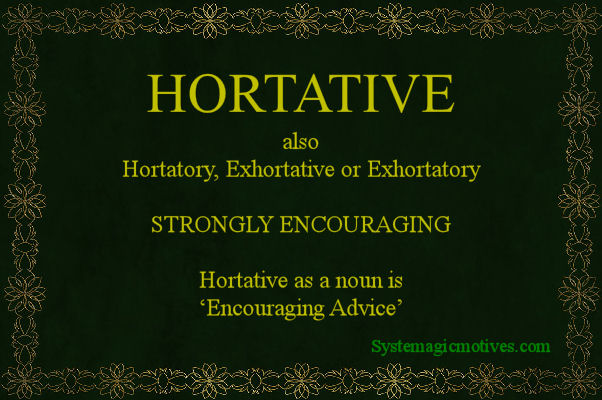The
terms "hortative" and "hortatory" both describe forms of communication
designed to encourage or persuade someone to take action. Both
originate from Latin roots that emphasize urging or advising.
"Hortative" is derived from the Latin word "hortari," which means "to
urge." It is used in contexts where the language or rhetoric is aimed
at motivating or stimulating action or behavior through direct
encouragement. Similarly, "hortatory," coming from "hortatus," carries
a similar meaning, focusing on urging or advising an audience to act in
a certain way. In rhetoric, both terms denote speeches or texts that
aim to spur the listener or reader to a specific course of action
through positive reinforcement or motivational appeal.
On
the other hand, "exhortative" and "exhortatory" convey a stronger sense
of urging or advising. These terms derive from the Latin "exhortari,"
meaning "to urge strongly." "Exhortative" describes language or speech
that provides strong encouragement or advice, often with a sense of
earnestness. It implies a more forceful approach to motivating someone
to take a particular action. Similarly, "exhortatory" is used to
describe communication that is not only urging but also fervently
encouraging action. It carries a connotation of heightened intensity in
the attempt to persuade or motivate.
Overall,
while all four terms relate to the act of encouraging or urging action,
"hortative" and "hortatory" are generally used to describe more
moderate forms of encouragement. In contrast, "exhortative" and
"exhortatory" are associated with more intense or forceful urging. Each
term reflects varying degrees of motivational effort, from gentle
encouragement to strong, impassioned urging, highlighting the nuances
in how we seek to positively influence others' actions.

